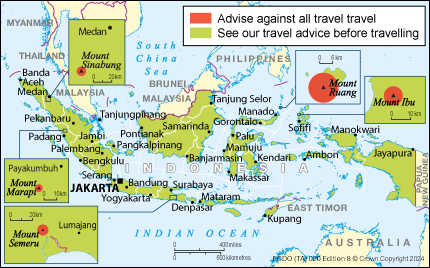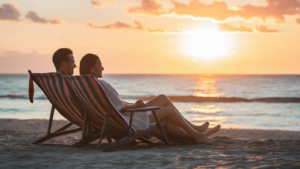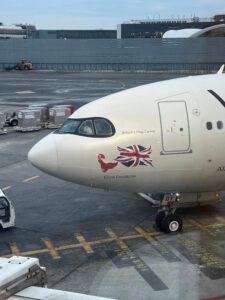Safety and security – Indonesia travel advice
11 min read
Safety and security
You should also read FCDO’s overall travel advice and regional risks advice.
Terrorism
There is a high threat of terrorist attack globally affecting UK interests and British nationals, including from groups and individuals who view the UK and British nationals as targets. You should remain vigilant at all times.
UK Counter Terrorism Policing has information and advice on staying safe abroad and what to do in the event of a terrorist attack. Find out how to reduce your risk from terrorism while abroad.
Terrorism in Indonesia
Terrorists are very likely to try to carry out attacks in Indonesia.
The threat from Islamist extremism remains high, though the Indonesian authorities continue to disrupt attack planning, including arresting alleged terrorists reportedly in the advanced stages of preparation.
Indonesian government and law enforcement interests and places of worship are regularly targeted by extremists. Western interests are also at risk. Small-scale attacks occur on a regular basis and further incidents are likely. Attacks could be indiscriminate, including in places frequented by foreigners. Potential targets include:
- beach resorts
- bars and restaurants
- hotels
- markets
- shopping malls hosting major international brand outlets
- tourist attractions
- places of worship
- foreign embassies
- polling stations
- ferry terminals and airports
There’s a heightened risk during holiday periods such as:
- Christmas, New Year and Easter
- Chinese New Year
- Nyepi (Balinese New Year)
- Islamic celebrations and holidays such as Ramadan
- local elections
- presidential inaugurations
- Independence Day (17 August)
Follow the advice of the local authorities, remain particularly vigilant and maintain a high level of security awareness in crowded places and at large gatherings.
Recent attacks include:
- in 2022, a suicide bomber attacked a Police post on Jalan Astana Anyar, in Bandung, West Java, killing one and injuring 8 people
- in 2021, there was a suicide attack outside the Catholic Cathedral Church at JaIan Kajaolalido, Makassar
- in 2020, a police officer was killed and another injured during an attack on a police station in Kalimantan
- in 2019, a suicide bomber attacked police headquarters in Medan, Sumatra, injuring 4 police officers and 2 civilians
- in 2018, there was an explosion at a police headquarters, and at 3 churches, in Surabaya, East Java, causing multiple deaths and injuries
Political situation
The political situation in Indonesia is stable. However, internal developments such as elections, presidential inaugurations and external developments, including in the Middle East, can trigger protests or unrest. Nationwide student protests took place in 2019 and 2020, and could reoccur at any time.
Indonesia held national elections on 14 February. Be more vigilant in the weeks after the vote. Demonstrations following the previous election in 2019 resulted in rioting and loss of life.
Avoid all protests, demonstrations and student and political rallies as they could become violent without notice.
Crime
Sexual assault
Reported cases of rape and sexual assault are high in Bali and Lombok. Exercise the same caution you would in the UK when travelling at night and avoid areas that are poorly lit.
If you want to travel by taxi, use only registered companies (such as Bluebird, Silverbird or Express) and ensure the driver’s identity is shown. If you are booking with a mobile app, check the driver is the same as the person on the app and share your journey with a friend using the app. Be wary of drivers claiming to be registered with online ride hailing apps trying to pick up passengers off the street.
Protecting your belongings
Be aware of the risk of street crime and pickpocketing, particularly in busy tourist areas in Bali, where there have been reports of bag-snatching. Concealing your bag as much as possible will help avoid bag-snatching and only carry essential items. Take care of your passport and bank cards.
Beware of thieves on public transport. If you’re travelling by car keep doors locked at all times.
Scams
Credit card fraud is common. Do not lose sight of your card during transactions. Criminals sometimes place a fake telephone number on ATMs advising customers to report problems.
Only use licensed currency exchangers. Licensed currency exchangers can be identified by the presence of a sign titled ‘Authorized Money Changer’ and the formal name of the business, accompanied by logos and certificates issued by the Bank of Indonesia. On the logos and branding, there should be a QR Code that when opened shows the information of the business and proof of licenses.
There has been a rise in the number of scams at tattoo parlours, nail salons and spas in Bali. Exercise caution when choosing your provider and ensure that you receive the service you request at the agreed price.
Drink and food spiking
There have been reports of sexual assaults and drink spiking in Bali, Lombok and the Gili Islands. Make sure drinks are prepared in front of you and do not accept drinks from strangers at clubs and parties or leaving drinks unattended. Tourists have also been robbed after taking visitors to their hotel rooms, and in some cases have found that their drinks were spiked.
Alcohol strength and drugs
Drinks served in bars can be stronger than those in the UK and the measures of spirits are larger. In some cases, over drinking and taking drugs has resulted in accidents, injuries, robbery, assaults and lost travel documents and some British nationals have suffered psychiatric problems caused by alcohol, drugs and a lack of sleep. Drink responsibly and be aware of your limits.
Drink poisoning (methanol)
People, including British nationals, have died or suffered serious illness in Indonesia after drinking alcoholic drinks contaminated with methanol.
Drink poisoning incidents have happened in bars, shops and hotels in tourist areas like Bali, Lombok, the Gili Islands and Sumatra. Criminal gangs make counterfeit replicas of well-known alcohol brands containing high amounts of methanol.
Take extreme care when buying spirit-based drinks. Bottles may appear to be genuine when they’re not, and bottle labels may not be accurate. Contaminated drinks have included:
- local spirits, including arak/arrack (a local rice or palm liquor)
- spirit-based drinks, such as cocktails
- brand name alcohol
Symptoms of methanol poisoning can be similar to those of alcohol poisoning. The fact sheet on TravelHealthPro has a list of symptoms for methanol poisoning.
To protect yourself from drink poisoning:
- buy or drink alcoholic beverages at reputable licensed premises
- be careful drinking cocktails and drinks made with spirits
- avoid home-made alcoholic drinks
- check bottle seals are intact
Seek urgent medical attention if you or someone you are travelling with show signs of alcohol-induced methanol poisoning or drink-spiking.
Laws and cultural differences
Religious holidays
Ramadan
Ramadan is a holy month for Muslims. The dates vary by year and country. Ramadan in Indonesia will take place on 10 March to 9 April 2024. During this time, do not:
- eat, drink, smoke or chew gum in public in the daytime, including in your car
- play loud music or dance
- swear in public
Get more advice when you arrive from your tour guide, hotel or business contacts.
You should also:
- check opening hours of shops and restaurants
- be aware that if hotels and restaurants are providing food or drink in fasting hours, they may separate you from Islamic guests, for example with screens
- follow local dress codes – clothing that does not meet local dress codes may cause more offence at this time
- be aware that driving may be erratic, particularly when people are trying to get home at dusk
- be patient and show tolerance
Balinese New Year
During Balinese New Year, known as Nyepi, local custom requires that all people in Bali observe a day of silence by staying indoors, turning off lights, and making no noise. Ngurah Rai International Airport is closed for the entire day. However, emergency services and hospitals are allowed to operate.
Personal ID
You must be able to show your valid travel document (passport) or stay permit (such as KITAS or KITAP) at any time when needed to do so by an active immigration officer.
Alcohol laws and bans
In the province of Aceh consumption, production and distribution of alcohol are all illegal under Sharia law. Punishment following a Sharia court process is public caning.
Illegal drugs and prison sentences
Do not get involved with illegal drugs. Possession, trafficking and manufacture of any illegal drugs are serious offences in Indonesia. The Indonesian authorities have a zero-tolerance policy and those caught face lengthy prison sentences or the death penalty, usually after a protracted and expensive legal process. British nationals have been caught and jailed for drug offences in Indonesia.
Police often raid venues (particularly in Bali) known to be frequented by foreigners. You may have to take a urine or blood test if there is a reasonable suspicion that drugs have been used. Criminal gangs in the UK and elsewhere are known to coerce people into carrying drugs across borders. Do not allow yourself to be persuaded.
LGBT+ travellers
The province of Aceh enforces Sharia law. It is the only province in Indonesia to do so and the laws apply to both Muslims and non-Muslims.
Homosexual activity is illegal under Sharia law. Punishment following a Sharia court process includes public caning, prison sentence or a fine which should be paid in gold.
Read more advice for LGBT+ travellers.
Wildlife, animal products and souvenirs
It’s illegal to buy, sell, kill or capture any protected wild animal or trade its parts without a license. Indonesia is a signatory to the Convention on International Trade in Endangered Species of Wild Fauna and Flora (CITES), which includes bans on trade in ivory and tiger parts. If you’re caught purchasing or trafficking illegal goods you’ll be prosecuted and could receive a prison sentence and fine.
Gambling
In the province of Aceh gambling is illegal under Sharia law. Punishment following a Sharia court process includes public caning, prison sentence or a fine which should be paid in gold.
Extra-marital sex
In the province of Aceh, extra-marital sex is illegal under Sharia law and punishable by public caning after a Sharia court process.
Transport risks
Road travel
You cannot drive in Indonesia using a UK driving licence. You can drive using an International Driving Permit issued in Indonesia. International Driving Permits issued in the UK may need to be endorsed by the Indonesian licensing office in Jakarta.
Before driving, riding or hiring any type of vehicle, ensure that you have the appropriate licence to do so. Check you are covered with your travel insurance company.
Traffic discipline is very poor and there are several moped and motorbike accidents, including serious injury and fatalities in Bali. Make sure you wear a helmet if you’re riding a motorbike or moped.
Foreigners involved in even minor traffic violations or accidents may be vulnerable to exploitation. Consider employing a private driver or hiring a car with a driver. Some multinational companies do not allow their expatriate staff to drive in Indonesia.
If you’re involved in an accident or breakdown, make sure someone remains with your vehicle. If you have any concerns for your security, move to another location safely. Make yourself available for questioning by the police if requested to do so.
Sea travel
Travelling by boat or ferry can be dangerous as the sea conditions can change rapidly. Vessels can be crowded, overloaded, poorly maintained and safety standards vary between providers.
Make sure you’re satisfied with safety standards before travelling, including availability of safety equipment such as life-jackets. Life-jackets suitable for children aren’t always available so you may need to bring your own. Avoid travelling after dark unless you’re satisfied the vessel is suitably equipped.
There have been attacks against ships in and around the waters of Indonesia. Mariners should be vigilant, reduce opportunities for theft, establish secure areas on board and report all incidents to the coastal and flag state authorities.
Extreme weather and natural disasters
Volcanic eruptions
There are lots of active volcanoes in Indonesia. They can erupt without warning. Villages within a 3 to 7 kilometre radius will usually be evacuated. Eruptions have caused destruction and fatalities.
There are 4 volcano alert levels:
- normal
- advisory
- watch
- warning
Check media reports before travelling to areas that are prone to volcanic activity. Take extra care and follow the advice of the local authorities, including respecting any exclusion zones. See the Multiplatform Application for Geohazard Mitigation and Assessment (MAGMA) in Indonesia for updates on volcanic activity (in Bahasa language).
Sometimes areas beyond local exclusion zones have been affected by mud and debris flows (particularly in valleys) and volcanic ash falls. While near any volcano, you should:
- monitor local media
- exercise caution
- follow the advice of the local authorities, including any evacuation orders
Ash clouds can affect flight schedules and the operation of regional airports. Check with your airline or travel company for the latest information.
Be aware that ash plumes can affect air quality and have an impact on health. A fitted face mask may provide some protection. While masks should be available in Indonesia, you may choose to buy your own before you travel.
If you have any pre-existing respiratory conditions, such as asthma, be aware that you might be at increased risk of triggering or worsening your symptoms. Make sure you travel with sufficient supplies of any regular medicines to cater for this.
In the event of a major eruption, they may be increased levels of particulate and gaseous pollutants in the air, even in areas outside of the exclusion zones. Face masks only offer protection against small particulate matter; they do not protect against hazardous gases emitted by a volcano. Unless you’re advised to evacuate, the best way to reduce your exposure is to remain inside and close all doors and windows.
Flooding
The Indonesian rainy season runs from September to January but can run into February. Monitor international and local weather reports if travelling during the rainy season.
Large areas of the country have been badly affected by heavy rains, landslides and flooding, including parts of:
- West Sumatra
- Central, East and West Java
- Jakarta
Flash floods and widespread flooding can occur across Indonesia. Cities, especially Jakarta, can suffer severe localised flooding which can result in major traffic congestion and power outages. The main toll road to Soekarno-Hatta International Airport and other major roads in Jakarta can be affected by flooding. Slips and landslides occur in mountainous and remote areas, but also in urban areas.
Take care when driving and walking. Keep a stock of bottled water and make sure your phone is charged.
Earthquakes and tsunamis
Earthquakes happen regularly. The US Federal Emergency Management Agency has advice about what to do before, during and after an earthquake.
If a major earthquake or landslide occurs close to shore, follow the instructions of local authorities, bearing in mind that a tsunami could arrive within minutes. The Indonesia Tsunami Early Warning Centre issues warnings when a potential tsunami with significant impact is imminent or expected.
Forest fires
Forest fires continue to burn in Indonesia’s forest and peatlands, mostly on Sumatra and Borneo, generating widespread haze that can affect air quality.
Discover more from Slow Travel News
Subscribe to get the latest posts sent to your email.



